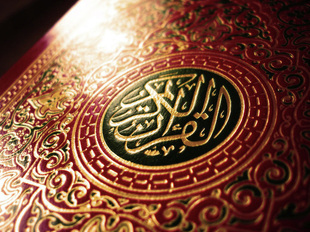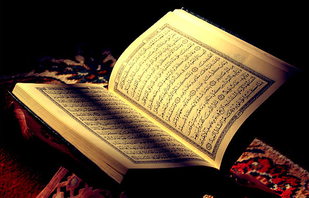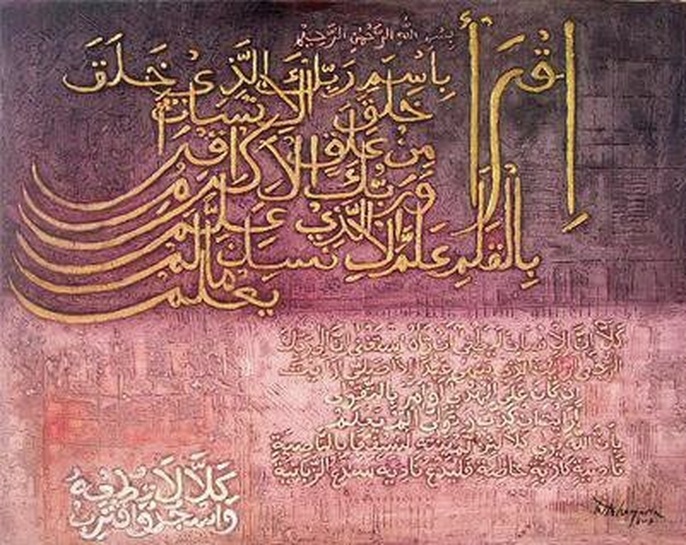Holy Quran
|
|
Quick Facts
|
The Quran (Arabic: القرآن ,Al-Quran) literally meaning "A recitation", also transliterated Qur'an, Koran, Coran, Kuran is the central religious text of Islam. The Qur'an is considered by Muslims to be "The Word of ALLAH (God)". It is regarded widely as the finest piece of literature in the Arabic language.
Muslims believe the Quran to be verbally revealed through angel Jibril (Gabriel) from ALLAH to Mohammad (Peace Be Upon Him) gradually over a period of approximately twenty-three years beginning in 610 CE, when Mohammad (Peace Be Upon Him) was forty, and concluding in 632 CE, the year of his death. The Qur'an was not written all together in book-form while Mohammad (Peace Be Upon Him) was alive; it was kept by oral communication and brief written records.
Shortly after Mohammad (Peace Be Upon Him) death the Quran was compiled into a single book by order of the first Caliph Abu Bakr (ALLAH Bless With Him) and at the suggestion of his future successor Umar (ALLAH Bless With Him). Hafsa (ALLAH Bless With Her), Mohammad (Peace Be Upon Him) wife and Umar's daughter, was entrusted with that Quranic text after the second Caliph Umar (ALLAH Bless With Him) died. When the third Caliph Uthman (ALLAH Bless With Him) began noticing slight differences in Arabic dialect he sought Hafsa's permission to use her text to be set as the standard dialect, the Quraish dialect now known as Fus'ha (Modern Standard Arabic). Before returning the text to Hafsa (ALLAH Bless With Her), Uthman (ALLAH Bless With Him) made several thousand copies of Quran invalidated all other versions of the Quran.
Muslims regard the Quran as the main miracle of Mohammad (Peace Be Upon Him), the proof of his prophethood and the culmination of a series of divine messages that started with the messages revealed to Adam (Peace On Him), regarded in Islam as the first prophet, and continued with the Suhuf Ibrahim (Peace On Him) (Scrolls of Abraham), the Tawrat (Torah or Pentateuch) of Moses (Peace On Him), the Zabur (Tehillim or Book of Psalms) of David (Peace On Him), and the Injil (Gospel) of Jesus (Peace On Him).
Muslims believe the Quran to be verbally revealed through angel Jibril (Gabriel) from ALLAH to Mohammad (Peace Be Upon Him) gradually over a period of approximately twenty-three years beginning in 610 CE, when Mohammad (Peace Be Upon Him) was forty, and concluding in 632 CE, the year of his death. The Qur'an was not written all together in book-form while Mohammad (Peace Be Upon Him) was alive; it was kept by oral communication and brief written records.
Shortly after Mohammad (Peace Be Upon Him) death the Quran was compiled into a single book by order of the first Caliph Abu Bakr (ALLAH Bless With Him) and at the suggestion of his future successor Umar (ALLAH Bless With Him). Hafsa (ALLAH Bless With Her), Mohammad (Peace Be Upon Him) wife and Umar's daughter, was entrusted with that Quranic text after the second Caliph Umar (ALLAH Bless With Him) died. When the third Caliph Uthman (ALLAH Bless With Him) began noticing slight differences in Arabic dialect he sought Hafsa's permission to use her text to be set as the standard dialect, the Quraish dialect now known as Fus'ha (Modern Standard Arabic). Before returning the text to Hafsa (ALLAH Bless With Her), Uthman (ALLAH Bless With Him) made several thousand copies of Quran invalidated all other versions of the Quran.
Muslims regard the Quran as the main miracle of Mohammad (Peace Be Upon Him), the proof of his prophethood and the culmination of a series of divine messages that started with the messages revealed to Adam (Peace On Him), regarded in Islam as the first prophet, and continued with the Suhuf Ibrahim (Peace On Him) (Scrolls of Abraham), the Tawrat (Torah or Pentateuch) of Moses (Peace On Him), the Zabur (Tehillim or Book of Psalms) of David (Peace On Him), and the Injil (Gospel) of Jesus (Peace On Him).
Etymology and meaning
The word Quran appears about 70 times in the Qur’an itself, assuming various meanings. It is a verbal noun (Masdar) of the Arabic verb Qaraa (Arabic: قرأ), meaning “He read” or “He recited.”
Others Names of Holy Quran
There are at least 55 Names of Quran which are supported by Verses of Quran. These names are as follow.
Name
Kitab
Qur’an Kalam Kalamullah Nur Huda Rahma Furqan Shifa’ Maw‘iza Dhikr Karim Ali Hikma Hakim Muhaiman Mubarak Habl As-Sirat Al-Mustaqim Al-Qiyyam Fasl Naba Azim Ahsan Al-Hadith Tanzil Ruh Wahy Al-Mathani Arabi Qawl Basa’ir Bayan Ilm Haqq Al-Hadi Ajab Tadhkira Al-Urwa Al-Wuthqa Mutashabih Sidq Adl Iman Amr Bushra Majid Zabur Mubin Bashir Nadhir Aziz Balagh Qassas Suhuf Mukarrama Marfua Mutahhara |
|
History of Quran
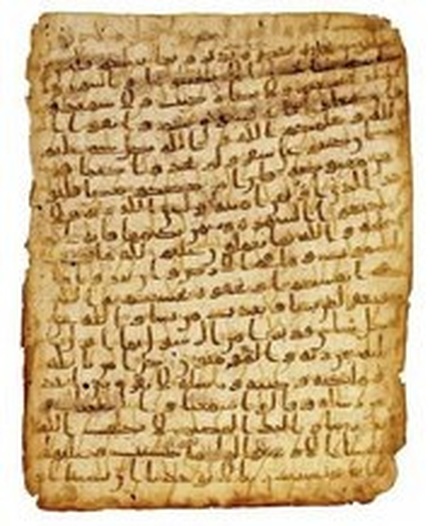
Qur'an manuscript from the 7th century CE, written on vellum in the Hijazi script.
Prophetic era
Muslims believe the Qur'an was first revealed to Mohammad (Peace Be Upon Him) by the archangel Gabriel in a cave on the mountain of Hira in Mecca during the month of Ramadan in 610 AD, and then over a period of twenty-three years until his death.
He would memorize the Qur'an by ear, and later recite it to his companions, who also memorized it.
According to Hadith and Muslim history, after Mohammad (Peace Be Upon Him) emigrated to Medina and formed an independent Muslim community, he ordered a considerable number of the Sahabah to recite the Quran and to learn and teach the laws, which were revealed daily. Since most Sahabah were unable to read or write, they were ordered to learn from the prisoners-of-war the simple writing of the time. Thus a group of sahabah gradually became literate. As it was initially spoken, the Quran was recorded on tablets, bones and the wide, flat ends of date palm fronds. However, the Quran did not exist in book form at the time of Mohammad (Peace Be Upon Him) death in 632.
Abu Bakr (ALLAH Bless With Him)
During the life of Mohammad (Peace Be Upon Him), parts of the Qur'an, though written, were scattered amongst his companions, much of it as private possession. After Mohammad (Peace Be Upon Him) death, Abu Bakr (ALLAH Bless With Him) initially exercised a policy of laissez faire as well. This policy was reversed after the Battle of Yamama in 633. During the battle, 700 Muslims who had memorized the Qur'an were killed. The death of Salim, however, was most significant, as he was one of the very few who had been entrusted by Mohammad (Peace Be Upon Him) to teach the Qur'an. Consequently, upon Umar's insistence, Abu Bakr (ALLAH Bless With Him) ordered the collection of the hitherto scattered pieces of the Qur'an into one copy.
Zaid Ibn Thabit (ALLAH Bless With Him), Mohammad (Peace Be Upon Him) primary scribe, was assigned the duty of collecting all of the Qur'anic text. This was his reaction:
"By ALLAH, if he (Abu Bakr) had ordered me to shift one of the mountains it would not have been harder for me than what he had ordered me concerning the collection of the Qur'an. So I started locating the Qur'anic material and collecting it from parchments, scapula, leafstalks of date palms and from the memories of men".
[Bukhari Sahih Al-Bukhari, 6:60:201]
The task required Ibn Thabit (ALLAH Bless With Him) to collect written copies of the Qur'an, with each verse having validated with the oral testimony of at least two companions. Usually the written copies were verified by himself and Umar - both of whom had memorized portions of the Qur'an. Thus, eventually the entire Qur'an was collected into a single copy, but it still wasn't given any particular order.
This compilation was kept by the Caliph Abu Bakr (ALLAH Bless With Him), after his death by his successor, Caliph Umar (ALLAH Bless With Him), who on his deathbed gave them to Hafsa Bint Umar (ALLAH Bless With Him), his daughter and one of Mohammad (Peace Be Upon Her) wives.
Ali Ibn Abu Talib (ALLAH Bless With Him)
Ali (ALLAH Bless With Him) compiled a mushaf, a complete version of Qur'an, within six months after the death of Mohammad (Peace Be Upon Him). When the volume was completed it was brought to Medina, where it was shown.
Uthman Ibn Affan (ALLAH Bless With Him)
By the time of the caliphate of Uthman Ibn Affan (ALLAH Bless With Him), there was a perceived need for the compilation of the Qur'an. The Caliphate had grown considerably, bringing into Islam's fold many new converts from various cultures with varying degrees of isolation. These converts spoke a variety of languages but were not well learned in Arabic and so a complete written text of the Qur'an had to be compiled. Another reason for compiling the Qur'an was that many of the Muslims who had memorised portions of the Qur'an were dying, especially in battle.
Uthman is said to have begun a committee (Including Zayd and several prominent members of Quraysh) to produce a standard copy of the text. Some accounts say that this compilation was based on the text kept by Hafsa (ALLAH Bless With Her). Other stories say that Uthman (ALLAH Bless With Him) made his compilation independently, Hafsa's text was brought forward, and the two texts were found to coincide perfectly.
Until this time there was reportedly only one written text of the Qur'an. According to Islamic accounts, this text was faithful to its original version. Thus, this became known as Al-Mushaf Al-Uthmani or the "Uthmanic codex". Uthman's reaction in 653 is recorded in the following:
So Uthman (ALLAH Bless With Him) sent a message to Hafsa (ALLAH Bless With Her) saying,
"Send us the manuscripts of the Qur'an so that we may compile the Qur'anic materials in perfect copies and return the manuscripts to you. Hafsa sent it to Uthman. Uthman then ordered Zaid Bin Thabit, Abdullah Bin Az Zubair, Said Bin Al-As and Abdur Rahman Bin Harith Bin Hisham (ALLAH Bless With All) to rewrite the manuscripts in perfect copies. Uthman said to the three Quraishi men, In case you disagree with Zaid Bin Thabit on any point in the Qur'an, then write it in the dialect of Quraish, the Qur'an was revealed in their tongue."
They did so, and when they had written many copies, Uthman returned the original manuscripts to Hafsa. Uthman sent to every Muslim province one copy of what they had copied, and ordered that all the other Qur'anic materials, whether written in fragmentary manuscripts or whole copies, be burnt.
Muslims believe the Qur'an was first revealed to Mohammad (Peace Be Upon Him) by the archangel Gabriel in a cave on the mountain of Hira in Mecca during the month of Ramadan in 610 AD, and then over a period of twenty-three years until his death.
He would memorize the Qur'an by ear, and later recite it to his companions, who also memorized it.
According to Hadith and Muslim history, after Mohammad (Peace Be Upon Him) emigrated to Medina and formed an independent Muslim community, he ordered a considerable number of the Sahabah to recite the Quran and to learn and teach the laws, which were revealed daily. Since most Sahabah were unable to read or write, they were ordered to learn from the prisoners-of-war the simple writing of the time. Thus a group of sahabah gradually became literate. As it was initially spoken, the Quran was recorded on tablets, bones and the wide, flat ends of date palm fronds. However, the Quran did not exist in book form at the time of Mohammad (Peace Be Upon Him) death in 632.
Abu Bakr (ALLAH Bless With Him)
During the life of Mohammad (Peace Be Upon Him), parts of the Qur'an, though written, were scattered amongst his companions, much of it as private possession. After Mohammad (Peace Be Upon Him) death, Abu Bakr (ALLAH Bless With Him) initially exercised a policy of laissez faire as well. This policy was reversed after the Battle of Yamama in 633. During the battle, 700 Muslims who had memorized the Qur'an were killed. The death of Salim, however, was most significant, as he was one of the very few who had been entrusted by Mohammad (Peace Be Upon Him) to teach the Qur'an. Consequently, upon Umar's insistence, Abu Bakr (ALLAH Bless With Him) ordered the collection of the hitherto scattered pieces of the Qur'an into one copy.
Zaid Ibn Thabit (ALLAH Bless With Him), Mohammad (Peace Be Upon Him) primary scribe, was assigned the duty of collecting all of the Qur'anic text. This was his reaction:
"By ALLAH, if he (Abu Bakr) had ordered me to shift one of the mountains it would not have been harder for me than what he had ordered me concerning the collection of the Qur'an. So I started locating the Qur'anic material and collecting it from parchments, scapula, leafstalks of date palms and from the memories of men".
[Bukhari Sahih Al-Bukhari, 6:60:201]
The task required Ibn Thabit (ALLAH Bless With Him) to collect written copies of the Qur'an, with each verse having validated with the oral testimony of at least two companions. Usually the written copies were verified by himself and Umar - both of whom had memorized portions of the Qur'an. Thus, eventually the entire Qur'an was collected into a single copy, but it still wasn't given any particular order.
This compilation was kept by the Caliph Abu Bakr (ALLAH Bless With Him), after his death by his successor, Caliph Umar (ALLAH Bless With Him), who on his deathbed gave them to Hafsa Bint Umar (ALLAH Bless With Him), his daughter and one of Mohammad (Peace Be Upon Her) wives.
Ali Ibn Abu Talib (ALLAH Bless With Him)
Ali (ALLAH Bless With Him) compiled a mushaf, a complete version of Qur'an, within six months after the death of Mohammad (Peace Be Upon Him). When the volume was completed it was brought to Medina, where it was shown.
Uthman Ibn Affan (ALLAH Bless With Him)
By the time of the caliphate of Uthman Ibn Affan (ALLAH Bless With Him), there was a perceived need for the compilation of the Qur'an. The Caliphate had grown considerably, bringing into Islam's fold many new converts from various cultures with varying degrees of isolation. These converts spoke a variety of languages but were not well learned in Arabic and so a complete written text of the Qur'an had to be compiled. Another reason for compiling the Qur'an was that many of the Muslims who had memorised portions of the Qur'an were dying, especially in battle.
Uthman is said to have begun a committee (Including Zayd and several prominent members of Quraysh) to produce a standard copy of the text. Some accounts say that this compilation was based on the text kept by Hafsa (ALLAH Bless With Her). Other stories say that Uthman (ALLAH Bless With Him) made his compilation independently, Hafsa's text was brought forward, and the two texts were found to coincide perfectly.
Until this time there was reportedly only one written text of the Qur'an. According to Islamic accounts, this text was faithful to its original version. Thus, this became known as Al-Mushaf Al-Uthmani or the "Uthmanic codex". Uthman's reaction in 653 is recorded in the following:
So Uthman (ALLAH Bless With Him) sent a message to Hafsa (ALLAH Bless With Her) saying,
"Send us the manuscripts of the Qur'an so that we may compile the Qur'anic materials in perfect copies and return the manuscripts to you. Hafsa sent it to Uthman. Uthman then ordered Zaid Bin Thabit, Abdullah Bin Az Zubair, Said Bin Al-As and Abdur Rahman Bin Harith Bin Hisham (ALLAH Bless With All) to rewrite the manuscripts in perfect copies. Uthman said to the three Quraishi men, In case you disagree with Zaid Bin Thabit on any point in the Qur'an, then write it in the dialect of Quraish, the Qur'an was revealed in their tongue."
They did so, and when they had written many copies, Uthman returned the original manuscripts to Hafsa. Uthman sent to every Muslim province one copy of what they had copied, and ordered that all the other Qur'anic materials, whether written in fragmentary manuscripts or whole copies, be burnt.
Manazil
Manzil (Arabic: منزل, Plural:منازل, Manazil) is the word for one of seven parts of roughly equal length into which the Qur'an is divided for the purpose of reciting the entire text in one week.
They are:
They are:
- Al-Fatihah (1) through An-Nisa (4)
- Al-Maida (5) through At-Tawba (9)
- Yunus (10) through An-Nahl (16)
- Isra (17) through Al-Furqan (25)
- Ash-Shuara (26) through Ya-Seen (36)
- As-Saffat (37) through Al-Hujarat (49)
- Qaf (50) through An-Nass (114)
- The first 4 chapters
- The next 5 chapters
- The next 7 chapters
- The next 9 chapters
- The next 11 chapters
- The next 13 chapters
- The remaining 65 chapters
Juz \ Para
A Juz (Arabic: جزء, Plural اجزاء) literally means "Part" is one of thirty parts of roughly equal length into which the Qur'an is sometimes divided. This division facilitates recitation of the Qur'an in a month, A Juz is further divided into two Ahzab (Groups), and each Hizb (Group) is in turn subdivided into four Quarters. The most commonly referred and memorized Juz is "Juz Amma", which is the 30th Juz and contains Surahs 78 through 114, most of the shortest Suras in the Qur'an. Amma is generally taught first to children. Juz Amma is named after the 1st word of the 1st Sura (i.e. Sura 78) in that Juz. Muslims from South Asia also refer to a Juz as a Para.
Suras \ Chapters
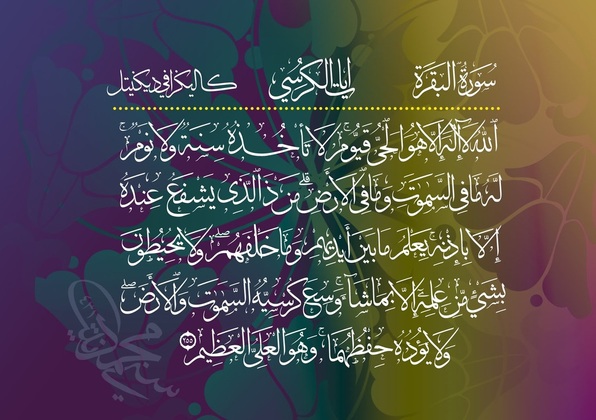
Ayatul Kursi, 255th Verse of the Sura Al-Baqara,Longest Sura of Quran
A Sura (Also spelled Surah, Surat; Arabic: سورة ) is a division of the Qur'an, often referred to as a chapter. The term chapter is sometimes avoided, as the Suras are of roughly unequal length; the shortest Sura (Al-Kawthar) has only three Ayat (Verses) while the longest (Al-Baqara) contains 286 Ayat.
Of the 114 Suras in the Qur'an, 86 are classified as Meccan while 28 are Medinan - this classification is only approximate as regards location of revelation - in actual fact, any sura revealed post-Hijrah is termed Medinan Sura and any revealed before that event is termed as Meccan Sura. The Meccan Suras generally deal with faith and scenes of the Hereafter, while the Medinan Suras are more concerned with organizing the social life of the nascent Muslim community.
Of the 114 Suras in the Qur'an, 86 are classified as Meccan while 28 are Medinan - this classification is only approximate as regards location of revelation - in actual fact, any sura revealed post-Hijrah is termed Medinan Sura and any revealed before that event is termed as Meccan Sura. The Meccan Suras generally deal with faith and scenes of the Hereafter, while the Medinan Suras are more concerned with organizing the social life of the nascent Muslim community.
Ayats \ Verses
Ayah or Aayah (Arabic: آية, Plural آيات Ayat) is the Arabic word for omen, sign, proof, commandment, law, rule and/or guidance.
The word is usually used to refer to a Verse of the Qur'an, i.e. the smallest unit of the Qur'an. Muslims believe that each Ayah of the Qur'an is a sign from God Called ALLAH in Arabic. Chapters in the Qur'an, called Sura in Arabic, are made up of several Ayahs. The total number of Verses in the Quran is 6666. The Verse number in a symbol is written at the end of each Verse. This symbol is , end of Ayah.
The word is usually used to refer to a Verse of the Qur'an, i.e. the smallest unit of the Qur'an. Muslims believe that each Ayah of the Qur'an is a sign from God Called ALLAH in Arabic. Chapters in the Qur'an, called Sura in Arabic, are made up of several Ayahs. The total number of Verses in the Quran is 6666. The Verse number in a symbol is written at the end of each Verse. This symbol is , end of Ayah.
Sajda-i-Tilawat
There are Ayats of Sajda at fourteen places in the Qur'an. For anyone who reads or hears one of them, even if he does not understand its meaning, it is Wajib to make one Sajda (Prostration). If a person is in a place where someone else is reading it, but does not hear it, he does not make the Sajda. A person who writes or spells an Ayat of Sajda does not make the Sajda. A person who hears or reads its translation makes the Sajda if he understands that it is an Ayat of Sajda.
It is wajib for those people for whom it is fard to perform namaz to make the Sajda upon hearing a Sajda-i-Tilawat. These are the name of Suras with Ayat which contains Sajda-i-Tilawat.
It is wajib for those people for whom it is fard to perform namaz to make the Sajda upon hearing a Sajda-i-Tilawat. These are the name of Suras with Ayat which contains Sajda-i-Tilawat.
- Sura Al-A'Raf (7), Ayat 206
- Sura Al-Ra'd (13), Ayat 15
- Sura Al-Nahl (16), Ayat 50
- Sura Bani Israil (17), Ayat 109
- Sura Maryum (19), Ayat 58
- Sura Al-Haj (22), Ayat 18
- Sura Al-Haj (22), Ayat 77 (Shafi)
- Sura Al-Farqan (25), Ayat 60
- Sura Al-Naml (27), Ayat 26
- Sura As Sajdah (32), Ayat 15
- Sura Sad (38), Ayat 24 (Hanafi)
- Sura Hamim Sajdah (41), Ayat 38
- Sura Al-Najam (53), Ayat 62
- Sura Inshiqaq (84), Ayat 21
- Sura Al-Alaq (96), Ayat 19
Muqattaat
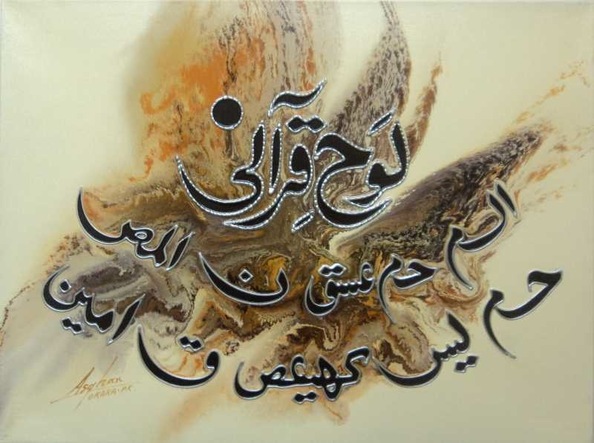
Muqattaat (Arabic: مُقَطَّعات ) are unique letter combinations that begin certain Suras of the Qur'an. Muqatta'at literally means abbreviated or shortened. Their meanings remain unclear and are considered by most Muslims to be divine secrets.
They are also known as fawatih (فواتح) or "Openers" as they form the opening Verse of their respective Suras. Other names include the broken, dis-joined, initial, or isolated letters of the Qur'an.
Of the 28 letters of the Arabic alphabet, exactly one half appear as muqattaat, either singly or in combinations of two, three, four or five letters. The fourteen letters are: أ ح ر س ص ط ع ق ك ل م ن ه ي (Alif, Ha, Ra, Sin, Sad, Ta, Ain, Qaf, Kaf, Lam, Mim, Nun, Ha, Ya). These Muqattaat are collectively called "Loh-e-Qurani".
There are 29 Suras of the Quran which contain Muqattaat.These are
They are also known as fawatih (فواتح) or "Openers" as they form the opening Verse of their respective Suras. Other names include the broken, dis-joined, initial, or isolated letters of the Qur'an.
Of the 28 letters of the Arabic alphabet, exactly one half appear as muqattaat, either singly or in combinations of two, three, four or five letters. The fourteen letters are: أ ح ر س ص ط ع ق ك ل م ن ه ي (Alif, Ha, Ra, Sin, Sad, Ta, Ain, Qaf, Kaf, Lam, Mim, Nun, Ha, Ya). These Muqattaat are collectively called "Loh-e-Qurani".
There are 29 Suras of the Quran which contain Muqattaat.These are
|
|
The First And Last Verse
First Verses Of Quran According To Revelation
The first revelation of Quran on Mohammad (Peace Be Upon Him) was Ayat of Sura Al-Alaq 1 To 5 are given below
بِسْمِ اللَّـهِ الرَّحْمَـٰنِ الرَّحِيمِ
اقْرَأْ بِاسْمِ رَبِّكَ الَّذِي خَلَقَ
پڑھو اپنے رب کے نام سے جس نے پیدا کیا
اقْرَأْ بِاسْمِ رَبِّكَ الَّذِي خَلَقَ
پڑھو اپنے رب کے نام سے جس نے پیدا کیا
Read with the name of your Lord Who created,
خَلَقَ الْإِنسَانَ مِنْ عَلَقٍ
آدمی کو خون کی پھٹک سے بنایا، پڑھو
آدمی کو خون کی پھٹک سے بنایا، پڑھو
Created man from a clot.
اقْرَأْ وَرَبُّكَ الْأَكْرَمُ
اور تمہارا رب ہی سب سے بڑا کریم
Read, and your Lord only is the Most Beneficent,
الَّذِي عَلَّمَ بِالْقَلَمِ
جس نے قلم سے لکھنا سکھایا
The One Who taught to write with the pen.
عَلَّمَ الْإِنسَانَ مَا لَمْ يَعْلَمْ
آدمی کو سکھایا جو نہ جانتا تھا
The One Who taught man all what he did not know.
Last Verse Of Quran According To Revelation
The last revelation of Quran on Mohammad (Peace Be Upon Him) was Ayat 3 of Sura Al-Maidah, is given below
بِسْمِ اللَّـهِ الرَّحْمَـٰنِ الرَّحِيمِ
حُرِّمَتْ عَلَيْكُمُ الْمَيْتَةُ وَالدَّمُ وَلَحْمُ الْخِنزِيرِ وَمَا أُهِلَّ لِغَيْرِ اللَّـهِ بِهِ وَالْمُنْخَنِقَةُ وَالْمَوْقُوذَةُ وَالْمُتَرَدِّيَةُ وَالنَّطِيحَةُ وَمَا أَكَلَ السَّبُعُ إِلَّا مَا ذَكَّيْتُمْ وَمَا ذُبِحَ عَلَى النُّصُبِ وَأَن تَسْتَقْسِمُوا بِالْأَزْلَامِ ۚ ذَٰلِكُمْ فِسْقٌ ۗ الْيَوْمَ يَئِسَ الَّذِينَ كَفَرُوا مِن دِينِكُمْ فَلَا تَخْشَوْهُمْ وَاخْشَوْنِ ۚ الْيَوْمَ أَكْمَلْتُ لَكُمْ دِينَكُمْ وَأَتْمَمْتُ عَلَيْكُمْ نِعْمَتِي وَرَضِيتُ لَكُمُ الْإِسْلَامَ دِينًا ۚ فَمَنِ اضْطُرَّ فِي مَخْمَصَةٍ غَيْرَ مُتَجَانِفٍ لِّإِثْمٍ ۙ فَإِنَّ اللَّـهَ غَفُورٌ رَّحِيمٌ
تم پر حرام ہے مُردار اور خون اور سور کا گوشت اور وہ جس کے ذبح میں غیر خدا کا نام پکارا گیا اور جو گلا گھونٹنے سے مرے اور بے دھار کی چیز سے مارا ہوا اور جو گر کر مرا اور جسے کسی جانور نے سینگ مارا اور جسے کوئی درندہ کھا گیا مگر جنہیں تم ذبح کرلو، اور جو کسی تھان پر ذبح کیا گیا اور پانسے ڈال کر بانٹا کرنا یہ گناہ کا کا م ہے، آج تمہارے دین کی طرف سے کافروں کی آس نوٹ گئی تو اُن سے نہ ڈرو اور مجھ سے ڈرو آج میں نے تمہارے لئے دین کامل کردیا اور تم پر اپنی نعمت پوری کردی اور تمہارے لئے اسلام کو دین پسند کیا تو جو بھوک پیاس کی شدت میں ناچار ہو یوں کہ گناہ کی طرف نہ جھکے تو بیشک اللہ بخشنے والا مہربان ہے
حُرِّمَتْ عَلَيْكُمُ الْمَيْتَةُ وَالدَّمُ وَلَحْمُ الْخِنزِيرِ وَمَا أُهِلَّ لِغَيْرِ اللَّـهِ بِهِ وَالْمُنْخَنِقَةُ وَالْمَوْقُوذَةُ وَالْمُتَرَدِّيَةُ وَالنَّطِيحَةُ وَمَا أَكَلَ السَّبُعُ إِلَّا مَا ذَكَّيْتُمْ وَمَا ذُبِحَ عَلَى النُّصُبِ وَأَن تَسْتَقْسِمُوا بِالْأَزْلَامِ ۚ ذَٰلِكُمْ فِسْقٌ ۗ الْيَوْمَ يَئِسَ الَّذِينَ كَفَرُوا مِن دِينِكُمْ فَلَا تَخْشَوْهُمْ وَاخْشَوْنِ ۚ الْيَوْمَ أَكْمَلْتُ لَكُمْ دِينَكُمْ وَأَتْمَمْتُ عَلَيْكُمْ نِعْمَتِي وَرَضِيتُ لَكُمُ الْإِسْلَامَ دِينًا ۚ فَمَنِ اضْطُرَّ فِي مَخْمَصَةٍ غَيْرَ مُتَجَانِفٍ لِّإِثْمٍ ۙ فَإِنَّ اللَّـهَ غَفُورٌ رَّحِيمٌ
تم پر حرام ہے مُردار اور خون اور سور کا گوشت اور وہ جس کے ذبح میں غیر خدا کا نام پکارا گیا اور جو گلا گھونٹنے سے مرے اور بے دھار کی چیز سے مارا ہوا اور جو گر کر مرا اور جسے کسی جانور نے سینگ مارا اور جسے کوئی درندہ کھا گیا مگر جنہیں تم ذبح کرلو، اور جو کسی تھان پر ذبح کیا گیا اور پانسے ڈال کر بانٹا کرنا یہ گناہ کا کا م ہے، آج تمہارے دین کی طرف سے کافروں کی آس نوٹ گئی تو اُن سے نہ ڈرو اور مجھ سے ڈرو آج میں نے تمہارے لئے دین کامل کردیا اور تم پر اپنی نعمت پوری کردی اور تمہارے لئے اسلام کو دین پسند کیا تو جو بھوک پیاس کی شدت میں ناچار ہو یوں کہ گناہ کی طرف نہ جھکے تو بیشک اللہ بخشنے والا مہربان ہے
Forbidden for you are carrion, and blood, and flesh of swine, and that which has been slaughtered while proclaiming the name of any other than ALLAH, and one killed by strangling, and one killed with blunt weapons, and one which died by falling, and that which was gored by the horns of some animal, and one eaten by a wild beast, except those whom you slaughter; and (Also forbidden is) that which is slaughtered at the altar (Of idols) and that which is distributed by the throwing of arrows (As an omen); this is an act of sin; this day, the disbelievers are in despair concerning your religion, so do not fear them and fear Me; this day have I perfected your religion for you* and completed My favour upon you, and have chosen Islam as your religion; so whoever is forced by intense hunger and thirst and does not incline towards sin, then indeed ALLAH is Oft Forgiving, Most Merciful.
*[Prophet Mohammad (Peace Be Upon Him) is the Last Prophet]
*[Prophet Mohammad (Peace Be Upon Him) is the Last Prophet]

